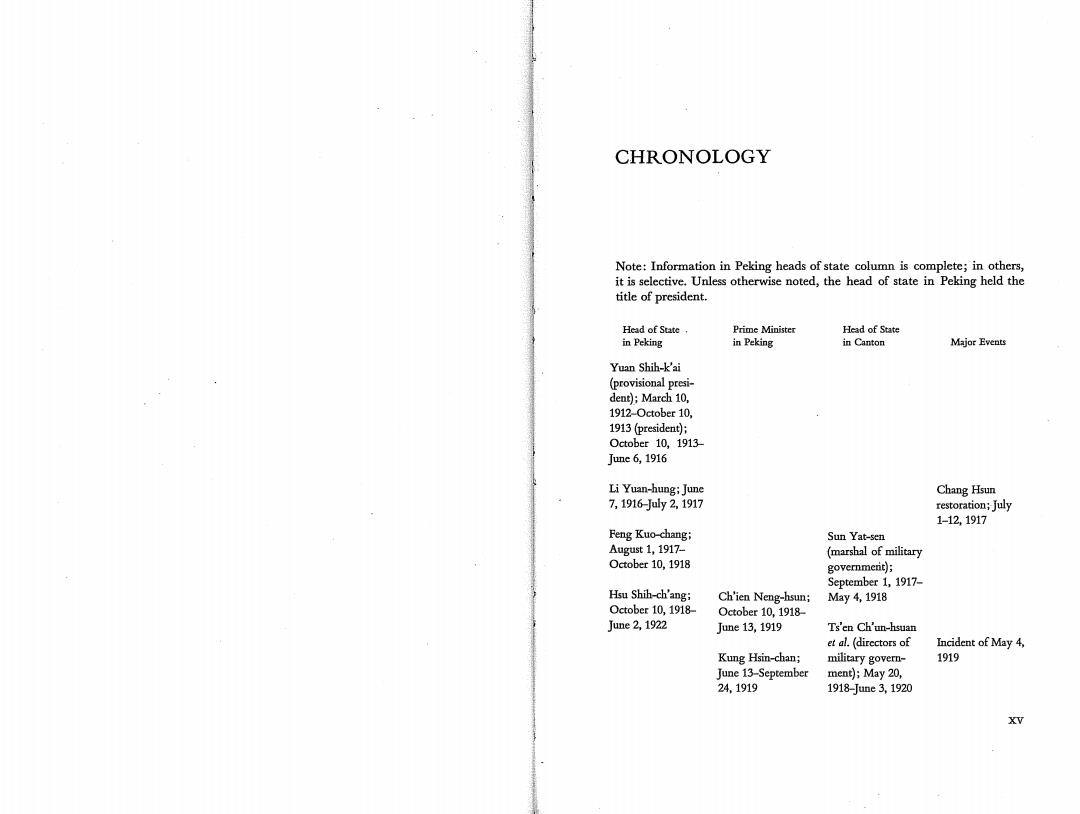
CHRONOLOGY Note:Information in Peking heads of state column is complete;in others, it is selective.Unless otherwise noted,the head of state in Peking held the title of president. Head of State Prime Minister Head of State in Peking in Peking in Canton Major Events Yuan Shih-k'ai (provisional presi- dent);March 10, 1912-October 10. 1913(president); October 10,1913- Jne6,1916 Li Yuan-hung:June Chang Hsun 7,1916Jy2,1917 restoration;july 1-12,1917 Feng Kuo-chang; Sun Yat-sen August 1,1917- ((marshal of military October 10,1918 governmerit); September 1,1917- Hsu Shih-ch'ang: Ch'ien Neng-hsun; May4,1918 October 10,1918- October 10,1918- June 2,1922 June13,1919 Ts'en Ch'un-hsuan et al.(directors of Incident of May 4, Kung Hsin-chan; military govern- 1919 June 13-September ment);May 20, 24,1919 1918-June3,1920 XV
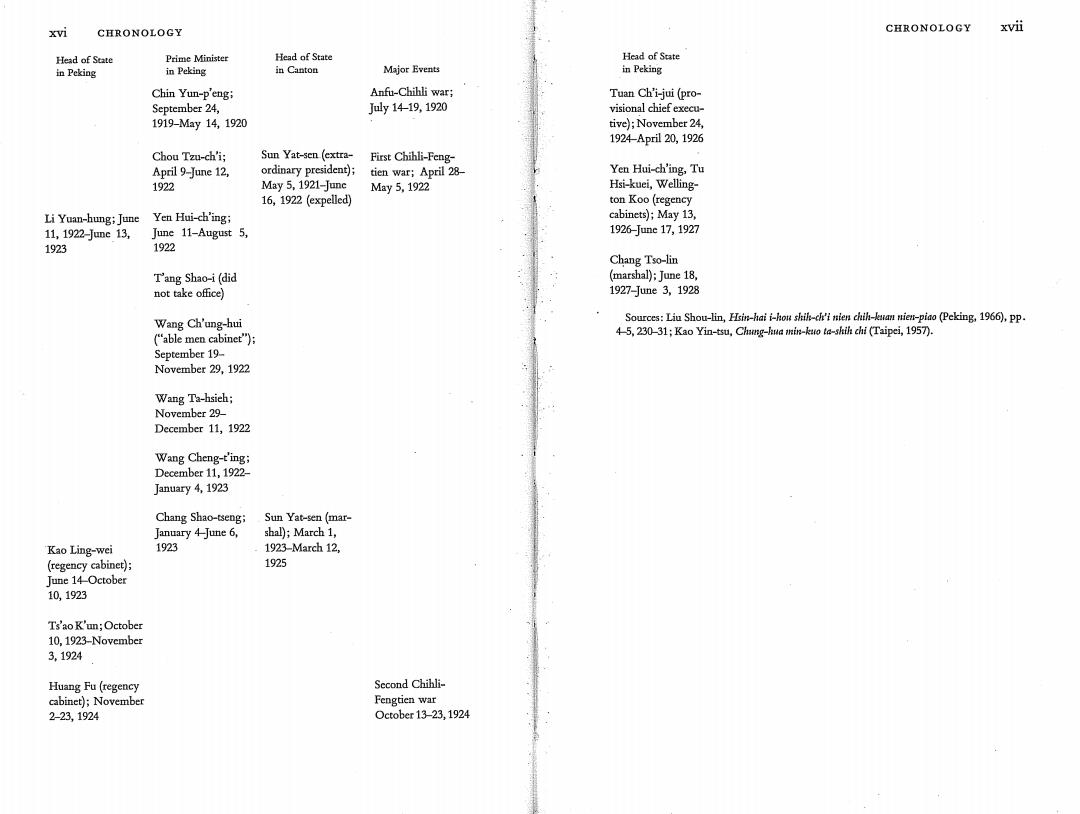
xvi CHRONOLOGY CHRONOLOGY xvii Head of State Prime Minister Head of State Head of State in Peking in Peking in Canton Major Events in Peking Chin Yun-p'engi Anfu-Chihli war; Tuan Ch'i-jui (pro- September 24, Jmy14-19,1920 visional chief execu- 1919-May14,1920 tive);November 24, 1924 April20,1926 Chou Tzu-ch'i; Sun Yat-sen (extra- First Chihli-Feng- April 9-June 12, ordinary president); tien war;April 28- Yen Hui-ch'ing,Tu 1922 May 5,1921-June May5,1922 Hsi-kuei,Welling- 16,1922 (expelled) ton Koo (regency Li Yuan-hung;June Yen Hui-ch'ing; cabinets);May 13, 11,1922Jjmc13, June 11-August 5, 1926-Jumc17,1927 1923 1922 Chang Tso-lin T'ang Shao-i(did (marshal);June 18, not take office) 1927June3,1928 Wang Ch'ung-hui Sources:Liu Shou-lin,Hsin-hai i-hon shic'i nien chih-kan nie-piao (Peking,1966),Pp. ("able men cabinet"); 4-5,230-31;Kao Yin-tsu,Chamng-hua min-keuo ta-shih chi (Taipei,1957). September 19- November 29,1922 Wang Ta-hsich; November 29- December 11,1922 Wang Cheng-t'ing; December 11,1922- January 4,1923 Chang Shao-tseng; Sun Yat-sen (mar- January 4-June 6, shal);March 1, Kao Ling-wei 1923 1923-March12, (regency cabinet); 1925 June 14-October 10,1923 Ts'ao K'un;October 10,1923-November 3.1924 Huang Fu(regency Second Chihli- cabinet);November Fengtien war 2-23,1924 October 13-23,1924
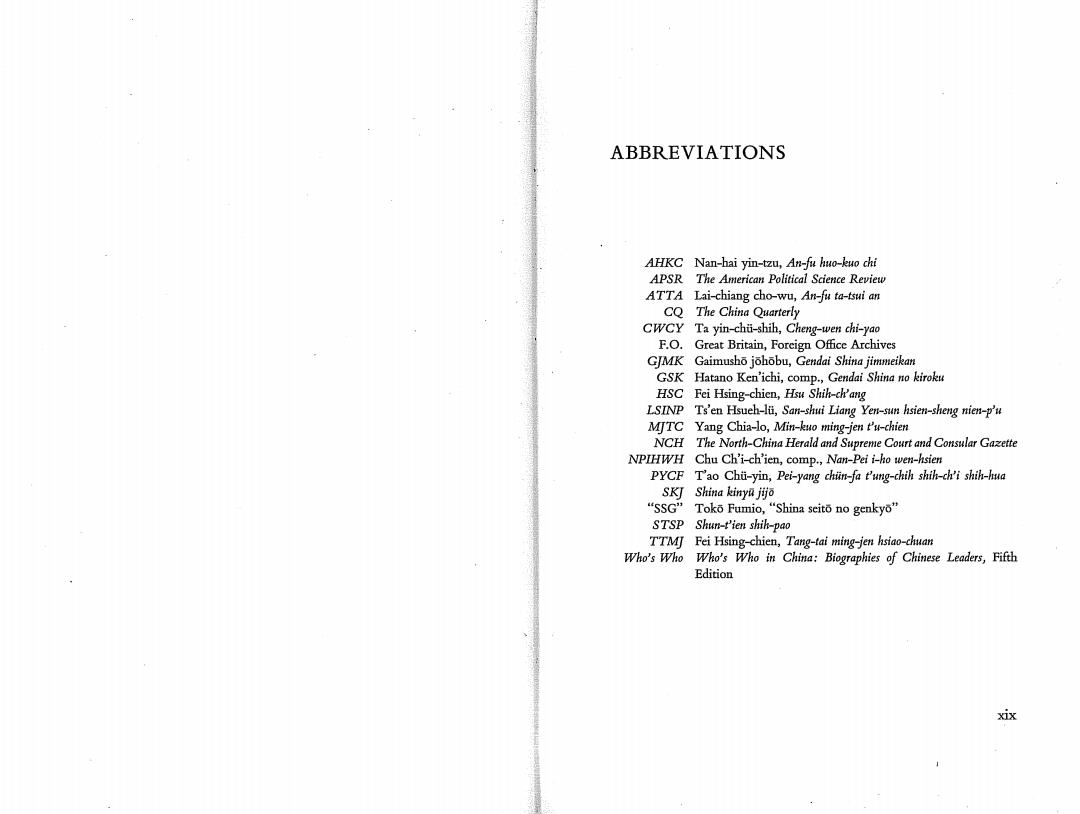
ABBREVIATIONS AHKC Nan-hai yin-tzu,An-fu huo-keuo chi APSR The American Political Science Review ATTA Lai-chiang cho-wu,An-fu ta-tsui an CQ The China Quarterly CWCY Ta yin-chii-shih,Cheng-wen chi-yao F.O.Great Britain,Forcign Office Archives GJMK Gaimusho johobu,Gendai Shina jimmeikan GSK Hatano Ken'ichi,comp.,Gendai Shina no kiroku HSC Fei Hsing-chien,Hsu Shih-ch'ang LSINP Ts'en Hsueh-lii,San-shui Liang Yen-sun hsien-sheng nien-p'u MITC Yang Chia-lo,Min-kuo ming-jen t'u-chien NCH The North-China Herald and Supreme Court and Consular Gazette NPIHWH Chu Ch'i-ch'ien,comp.,Nan-Pei i-ho wen-hsien PYCF T'ao Chi-yin,Pei-yang chiin-fa t'ung-chih shih-ch'i shih-hua SKI Shina kinya jijo “SSG”Toko Fumio,“Shina seito no genkyǒ” STSP Shun-t'ien shih-pao TTM]Fei Hsing-chien,Tang-tai ming-jen hsiao-chuan Who's Who Who's Who in China:Biographies of Chinese Leaders,Fifth Edition xix
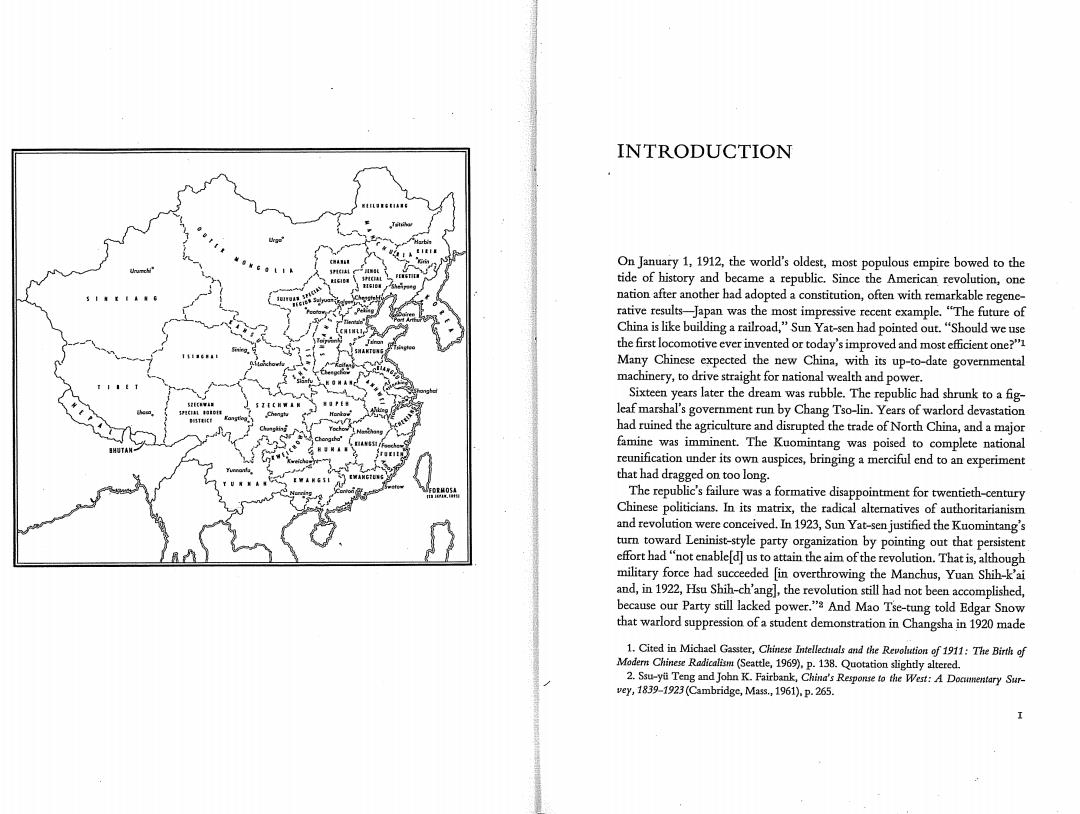
INTRODUCTION CHANES On January 1,1912,the world's oldest,most populous empire bowed to the tide of history and became a republic.Since the American revolution,one nation after another had adopted a constitution,often with remarkable regene- rative results-Japan was the most impressive recent example."The future of China is like building a railroad,"Sun Yat-sen had pointed out."Should we use the first locomotive ever invented or today's improved and most efficient one?" Many Chinese expected the new China,with its up-to-date governmental machinery,to drive straight for national wealth and power. 1 Sixteen years later the dream was rubble.The republic had shrunk to a fig- ITEYA 3积Gtt时体 leaf marshal's government run by Chang Tso-lin.Years of warlord devastation NSTEIEI had ruined the agriculturc and disrupted the trade of North China,and a major famine was imminent.The Kuomintang was poised to complete national reunification under its own auspices,bringing a merciful end to an experiment that had dragged on too long. The republic's failure was a formative disappointment for twentieth-century Chinese politicians.In its matrix,the radical alteratives of authoritarianism and revolution were conceived.In 1923,Sun Yat-sen justified the Kuomintang's turn toward Leninist-style party organization by pointing out that persistent effort had"not enabled]us to attain the aim of the revolution.That is,although military force had succeeded [in overthrowing the Manchus,Yuan Shih-k'ai and,in 1922,Hsu Shih-ch'ang],the revolution still had not been accomplished, because our Party still lacked power."And Mao Tse-tung told Edgar Snow that warlord suppression of a student demonstration in Changsha in 1920 made 1.Cited in Michael Gasster,Chinese Intellectuals and the Revolution of 1911:The Birth of Modern Chinese Radicalis(Seattle,1969).p.138.Quotation slightly altered. 2.Ssu-yi Teng and John K.Fairbank,China's Response to the West:A Docmentary Sur- vey,1839-1923(Cambridge%,Mas8,1961).p.265. I
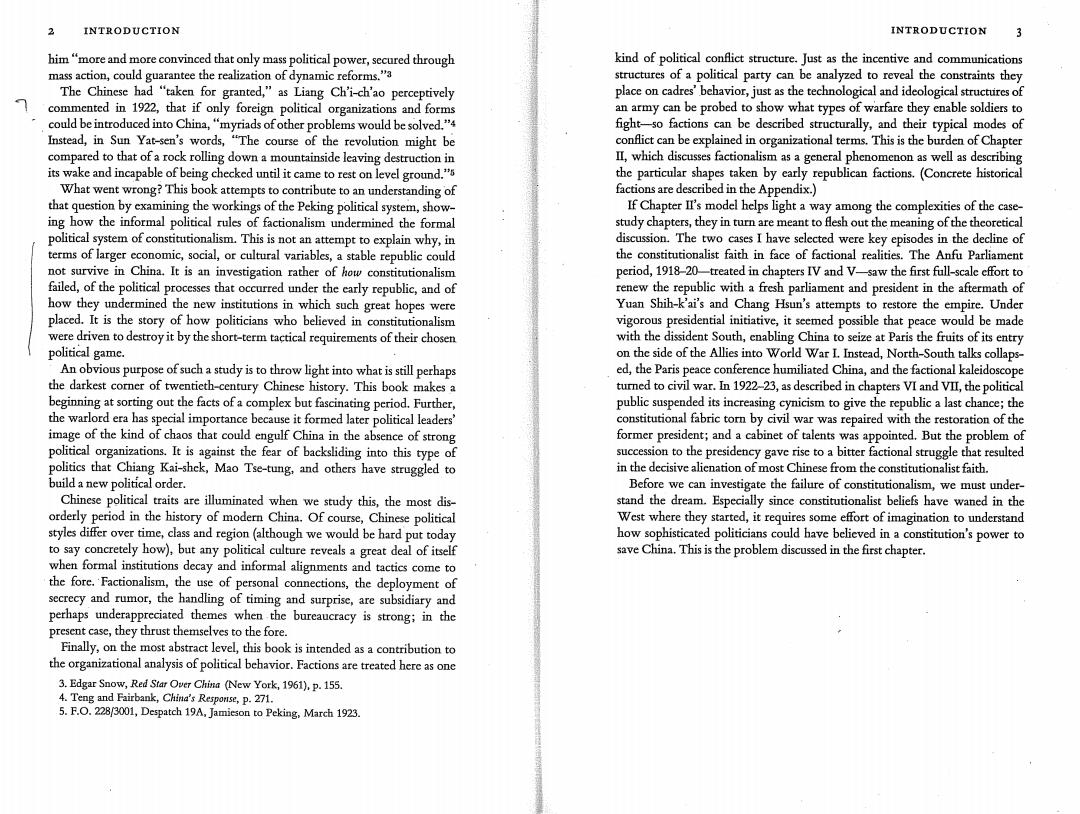
INTRODUCTION INTRODUCTION 3 him"more and more convinced that only mass political power,secured through kind of political conflict structure.Just as the incentive and communications mass action,could guarantee the realization of dynamic reforms."3 structures of a political party can be analyzed to reveal the constraints they The Chinese had "taken for granted,"as Liang Ch'i-ch'ao perceptively place on cadres'behavior,just as the technological and ideological structures of commented in 1922,that if only foreign political organizations and forms an army can be probed to show what types of warfare they enable soldiers to could be introduced into China,"myriads of other problems would be solved." fight-so factions can be described structurally,and their typical modes of Instead,in Sun Yat-sen's words,"The course of the revolution might be conflict can be explained in organizational terms.This is the burden of Chapter compared to that of a rock rolling down a mountainside leaving destruction in II,which discusses factionalism as a general phenomenon as well as describing its wake and incapable of being checked until it came to rest on level ground. the particular shapes taken by early republican factions.(Concrete historical What went wrong?This book attempts to contribute to an understanding of factions are described in the Appendix.) that question by examining the workings of the Peking political system,show- If Chapter II's model helps light a way among the complexities of the case- ing how the informal political rules of factionalism undermined the formal study chapters,they in turn are meant to flesh out the meaning of the theoretical political system of constitutionalism.This is not an attempt to explain why,in discussion.The two cases I have selected were key episodes in the decline of terms of larger economic,social,or cultural variables,a stable republic could the constitutionalist faith in face of factional realities.The Anfu Parliament not survive in China.It is an investigation rather of how constitutionalism period,1918-20-treated in chapters IV and V-saw the first full-scale effort to failed,of the political processes that occurred under the early republic,and of renew the republic with a fresh parliament and president in the aftermath of how they undermined the new institutions in which such great hopes were Yuan Shih-k'ai's and Chang Hsun's attempts to restore the empire.Under placed.It is the story of how politicians who believed in constitutionalism vigorous presidential initiative,it seemed possible that peace would be made were driven to destroy it by the short-term tactical requirements of their chosen with the dissident South,cnabling China to seize at Paris the fruits of its entry political game. on the side of the Allies into World War I.Instead,North-South talks collaps- An obvious purpose of such a study is to throw light into what is still perhaps ed,the Paris peace conference humiliated China,and the factional kaleidoscope the darkest corner of twentieth-century Chinese history.This book makes a turned to civil war.In 1922-23,as described in chapters VI and VII,the political beginning at sorting out the facts of a complex but fascinating period.Further, public suspended its increasing cynicism to give the republic a last chance;the the warlord era has special importance because it formed later political leaders' constitutional fabric torn by civil war was repaired with the restoration of the image of the kind of chaos that could engulf China in the absence of strong former president;and a cabinet of talents was appointed.But the problem of political organizations.It is against the fear of backsliding into this type of succession to the presidency gave rise to a bitter factional struggle that resulted politics that Chiang Kai-shek,Mao Tse-tung,and others have struggled to in the decisive alienation of most Chinese from the constitutionalist faith. build a new political order. Before we can investigate the failure of constitutionalism,we must under- Chinese political traits are illuminated when we study this,the most dis- stand the dream.Especially since constitutionalist beliefs have waned in the orderly period in the history of modern China.Of course,Chinese political West where they started,it requires some effort of imagination to understand styles differ over time,class and region(although we would be hard put today how sophisticated politicians could have believed in a constitution's power to to say concretely how),but any political culture reveals a great deal of itself save China.This is the problem discussed in the first chapter. when formal institutions decay and informal alignments and tactics come to the fore.Factionalism,the use of personal connections,the deployment of secrecy and rumor,the handling of timing and surprise,are subsidiary and perhaps underappreciated themes when the bureaucracy is strong;in the present casc,they thrust themselves to the fore. Finally,on the most abstract level,this book is intended as a contribution to the organizational analysis of political behavior.Factions are treated here as one 3.Edgar Snow,Red Star Over China (New York,1961),p.155. 4.Teng and Fairbank,China's Resporse,p.271. 5.F.O.228/3001,Despatch 19A.Jamieson to Peking,March 1923